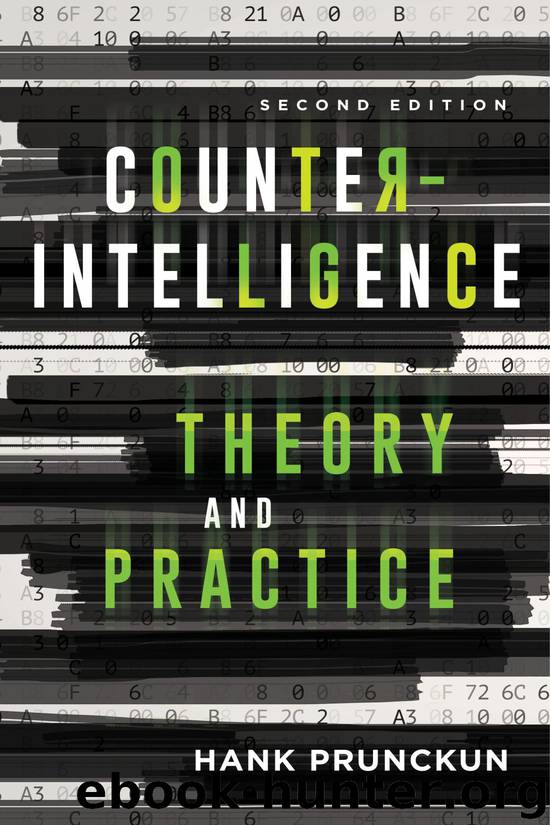Counterintelligence Theory and Practice by Hank Prunckun;

Author:Hank Prunckun;
Language: eng
Format: epub
Publisher: Rowman & Littlefield Publishing Group, Inc.
PHOTO 7.1 Polygraph Interrogation. Source: Courtesy of the Federal Bureau of Investigation.
These problems have seen KGB moles like Aldrich Ames pass not only one polygraph session, but two interrogations. Conversely, they have been many reported false-positives that resulted in people who have not violated23their secrecy oaths, that “deception [was] indicated.”24 Nevertheless, “a lack of evidence supporting the scientific validity of polygraph testing does not invalidate the polygraph as a security-screening device.”25 Though, even with the best trained operators, the error rate is unlikely to reach zero. This underscores the need to obtain corroborating evidence in cases where the polygraph indicates information concealment. Still, the polygraph remains “the best [mass] security-screening device available.”26
What Should Not Be Considered Adverse
There are two situations that present themselves as issues that should be approached by a counterintelligence investigator with balanced judgment. The first issue is about a person’s financial problems and the second involve psychological issues.
Noticing changes in staff behavior may be not only good management, but good counterintelligence practice too. Changes in a person’s mood or actions may be an indicator of deeper personal turmoil. If, say, a staffer has become more and more argumentative and his or her discussions with colleagues increasingly heated over time, it may mean more attention needs to be paid to find out why this could be happening. Take for instance the case of the WikiLeaks informant, Private First-Class Bradley Manning. Now known as Chelsea Manning, she was convicted by court martial in 2013 for violations of the U.S. Espionage Act. Media reports allege that she was suffering from psychological stress before her leaking of some 750,000 classified documents.27
The excessive use of alcohol has been identified as one such indicator. This could potentially give rise to temptation or attraction to compromise information in a misguided attempt to solve personal issues (take, for instance, the case of Aldrich Ames who was reported to have had a drinking problem28). It is not to say that a personal issue or a drinking problem is cause by itself to not grant or revoke a security clearance, but it does mean that a closer examination is warranted. History has shown that such issues have led, directly or indirectly, to staff disclosing classified information as a way of exacting revenge against the agency, or to bail them out of financial difficulty, or any number of other justifications for these problems (real or imagined).
Getting a person to talk to a counselor who is part of the agency’s employee assistance program is a good start to help resolve the problem before it harms the individual or the agency. Such steps are no longer considered in an adverse manner but are the healthy exercise of good judgment, as they seek to maintain a sound state of mind, as well to keep-up work performance. Just because a staffer seeks psychological counseling is not grounds per se for suspicion—it is a sensible move to get life back to normal. By contrast, not seeking counseling may be an indicator that things could get worse.
Download
This site does not store any files on its server. We only index and link to content provided by other sites. Please contact the content providers to delete copyright contents if any and email us, we'll remove relevant links or contents immediately.
| Espionage | Hoaxes & Deceptions |
| Murder & Mayhem | Organized Crime |
| Serial Killers | White Collar Crime |
Mindhunter: Inside the FBI's Elite Serial Crime Unit by John E. Douglas & Mark Olshaker(8702)
Wiseguy by Nicholas Pileggi(5319)
Hitman by Howie Carr(4827)
Room 212 by Kate Stewart(4739)
Secrecy World by Jake Bernstein(4389)
Killers of the Flower Moon: The Osage Murders and the Birth of the FBI by David Grann(4189)
Breaking Free by Rachel Jeffs(4011)
Papillon (English) by Henri Charrière(3906)
Killers of the Flower Moon by David Grann(3751)
Say Nothing by Patrick Radden Keefe(3725)
American Kingpin by Nick Bilton(3509)
The Secret Barrister by The Secret Barrister(3422)
Molly's Game: From Hollywood's Elite to Wall Street's Billionaire Boys Club, My High-Stakes Adventure in the World of Underground Poker by Molly Bloom(3335)
Mysteries by Colin Wilson(3250)
In Cold Blood by Truman Capote(3136)
I'll Be Gone in the Dark by Michelle McNamara(2888)
Signature in the Cell: DNA and the Evidence for Intelligent Design by Stephen C. Meyer(2875)
Rogue Trader by Leeson Nick(2825)
Bunk by Kevin Young(2808)
